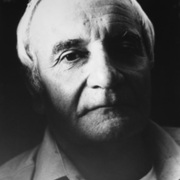Lindsay Anderson (1) (1923–1994)
Author of If.... [1968 film]
Series
Works by Lindsay Anderson
Britannia Hospital [1982 film] 11 copies
Six Plays By Alan Bennett: The Complete Series [DVD] — Director — 4 copies
Henry 2 copies
Britannia Hospital [script] 2 copies
O Dreamland 1 copy
Wakefield Express 1 copy
Every Day Except Christmas 1 copy
Thursday's Children 1 copy
Britannia Hospital [Kino Lorber Studio Classics] — Director — 1 copy
March to Aldermaston 1 copy
Associated Works
Tagged
Common Knowledge
- Birthdate
- 1923-04-17
- Date of death
- 1994-08-30
- Gender
- male
- Nationality
- UK
- Birthplace
- Bangalore, India
- Occupations
- film director
film critic
actor - Relationships
- Reisz, Karel (colleague)
Members
Reviews
Awards
You May Also Like
Associated Authors
Statistics
- Works
- 21
- Also by
- 1
- Members
- 284
- Popularity
- #82,067
- Rating
- 3.9
- Reviews
- 5
- ISBNs
- 44
- Languages
- 3






Anderson made comparatively few films but they stand out in an often anodyne British cinema. If….and O Luck Man! are among the best films ever made about England but are also atypical of British cinema in their emotional intensity, confrontational power, intellectual and moral seriousness, rejection of naturalism and their engagement with political and social reality.
Lindsay Anderson was a filmmaker, film critic and theatre director. He was one of the founders of the Free Cinema movement in the mid-fifties. This collection of his essays on cinema and theatre spans over forty years and is charged with his trenchant intellect and abrasive humanity. It’s essential reading for anyone interested in post-war cinema and theatre.
Anderson’s essays from the late ‘50s and early ‘60s are full of a combative confidence and sense of optimism. This was the time of the Angry Young Men, the Royal Court Theatre and the emergence of the New Left. Change was in the air. Anderson was reacting against a British cinema and theatre culture which he regarded as hopelessly cosy, out of touch, middle class and southern English. His hope was that it would be possible to create a more democratic kind of British culture (and, indeed, society) which was neither elitist or populist and one which would be a true reflection of the whole country.
It’s clear from Paul Ryan’s introduction that, in his later years, these pieces made rather uncomfortable reading for Anderson. The revolution had been cancelled and English society remained as class-bound and, in his view, philistine as ever. It’s difficult to place him politically in these later years but his sense of alienation from a society he regarded as increasingly conformist comes across strongly in some of the pieces from the 1980s. There are nostalgic backward glances to the ‘60s (‘a decade of vitality and hope’). His disillusion is painfully clear but he remained a powerful dissenting voice.
The long opening section of this book, in which Anderson looks back at all of his films, is full of fascinating insights. If…. is Anderson’s most famous film and also his most perfect. Released towards the end of 1968, a year of youthful uprisings, this depiction of an armed insurrection at an English public school was fortuitous in its timing, but that is perhaps the least important thing about it. If….. is not about the student rebellions of the late ‘60s; it’s a poetic film about England which explores timeless and universal themes of authority and anarchy, conformism and rebellion. Anderson wanted films to reflect society but equally he thought they should be a reflection of the filmmaker (‘no film can be too personal’ said his Free Cinema manifesto). If….might be described as a deeply personal film about England. As Stephen Frears has said it says a lot about England but also a lot about Lindsay Anderson. It begins almost as a documentary about a public school and then builds through colour and monochrome, Brechtian distancing techniques and Bunuelian surrealism to a poetic cinematic metaphor of pure rebellion. Despite its apocalyptic ending If….is a film of some subtlety and ambivalence. The main location was Anderson’s alma mater Cheltenham College and, in his later years, Anderson would often speak of how happy he had been there.
Luckily, If…. and Anderson’s other major films are still available. Watch one of them today and be invigorated by a cinematic intelligence that was as poetic as it was confrontational and as autobiographical at it was outward-looking.… (more)